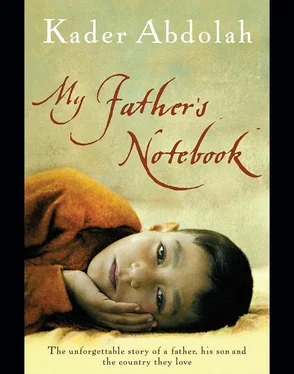I wanted to hug him, but he didn’t give me the chance to do that, either. He pointed to the top of Saffron Mountain and said, “Go!”
I started climbing and at every turn I looked back at my father, still standing at the cemetery gate.
“Loss is an experience that eventually leads to a new road,
to a new opportunity to think of things in a different way.
Losing is not the end of everything, but merely the end of a
particular way of thinking. If you fall in one place, get up
again in another. That’s a cardinal rule of life.”
Those were the words of the Persian poet Mohammad
Mokhtari, a comrade of Ishmael’s, who refused to flee.
His body was found behind a salvage yard outside
Tehran. According to Western news reports, he was
strangled by the secret police.

Ishmael left. He took the path to Saffron Mountain and Aga Akbar remained standing at the cemetery gate until he could no longer tell the difference between Ishmael and the rocks.
Akbar knew from experience that once people vanished to the other side of the mountain, they never returned. But where did they all go?
If Ishmael thought there was no alternative, he had to leave. But what was Akbar going to tell Tina?
The sun had risen and the mothers had slipped away from the cemetery. An old woman with a cane hobbled over to Akbar. “Good morning, Aga!” she said. “What on earth have you been staring at for so long?”
“Salaam,” Akbar gestured. “I’ve been watching the sun rise over Saffron Mountain. You can see dark clouds on the other side. It’s snowing over there.”
He had to hurry home. He’d never come back from the mosque so late. Tina would be worried.
She was waiting for him at the door. “Where have you been?” she cried. “Where’s your coat? Why didn’t you buy any bread? Where’s your toilet bag?”
Oh, the toilet bag! Where had he left it?
“I’ll tell you inside,” he gestured. “Come in, shut the door and lock it! Where’s Golden Bell? Call her! I have something important to tell you. He climbed the mountain. He left. He’s gone.”
“What are you talking about? Who climbed the mountain? Who’s gone?”
“He disappeared into the mountains. To the place with the red flags. Where’s Golden Bell? Call her! I told him to stay away from the railway tracks, otherwise the gendarmes would be able to see him through their binoculars.”
“Golden Bell!” Tina called. “Come here, I don’t understand what your father’s saying. He came home without his coat or toilet bag, he didn’t bring us any bread and he’s rambling on about someone who’s gone. God help me, that man comes home every day with a different story! Akbar, what did you do with your coat?”
Tina immediately knew what he was talking about, she just didn’t want to believe it. She needed to have it confirmed by someone else. Golden Bell came in.
“He’s gone,” Akbar signed.
“Really? When?”
“He’s on his way to Saffron Mountain.”
“Ishmael’s gone, Mother,” Golden Bell said.
Tina sat down and burst into sobs.
“You should be glad he’s gone. Imagine what would happen if the mullahs got hold of him. I mean it, Mother, don’t cry. If he takes the right route, the gendarmes won’t catch him and he’ll be free. He can do it. He knows the way, he knows how to stay out of sight. Don’t cry, Mother. You should be praying for his escape with all your heart. Sit down, Father. Here’s a glass of tea. Drink it, it’ll warm you. Tell me what happened.”
He took the tea, sat down and signed: “I was on my way to the mosque this morning when someone tapped me on the shoulder. I turned around and saw Ishmael. He said he was going to the mountains, but he didn’t have any warm clothes, or any bread, either. Oh, I think I left my toilet bag in the bakery … Anyway, he’s not wearing the right shoes.”
Golden Bell sat down beside him. “It’ll be all right. He’ll manage.”
They were sitting so close together that Tina couldn’t follow their sign language. “What are you two talking about?” she said angrily. “Are you trying to keep something from me? Is this another of your father — daughter secrets?”
“Sorry, Mother, I didn’t mean to—”
“Oh, yes, you did,” Tina snapped. “I’m fed up with all the secrets in this house. I’ve had enough of father — son secrets. And of your secrets, too, Golden Bell. Where will all that secrecy lead to? Nowhere. Just look at what’s happened to your brother. He’s probably in the hands of the gendarmes right now! Oh, my God! Ishmael!”
“Mother, please don’t shout. Before you know it, the neighbours will be at the door.”
“Let this be a lesson to you, Golden Bell. Wake up, open your eyes! Your brother, your great example, is gone. You’ll be next. I wish—” She burst into loud wails.
“There’s no need for hysterics, Mother,” Golden Bell said. “Ishmael hasn’t reached the border yet. He’s still got a long walk ahead of him. Here’s your chador. Go and pray for him. That’s all you can do for him now. Father, go to your shop as usual. I’ll be along in a little while.”
Akbar got to his feet. “He’ll phone us when he reaches the other side,” he signed. “The people over there are different, you know, and they … where’s the map?”
“This is no time for maps!” Tina shrieked. She took her chador and stomped out of the room.
Ishmael didn’t phone. Nor did they get a letter from him. He wasn’t allowed to write or make phone calls. People who fled to the Soviet Union knew better than to get in touch with their families. A letter from the Soviet Union? A hammer-and-sickle postmark? A Lenin stamp? It was unthinkable!
Every time the phone rang and Tina rushed over to pick it up, Akbar looked at her.
“No?”
“No.”
Every time the postman went by the shop, Akbar gestured: “No letter?”
“No, no letter.”
However, they were almost certain that he hadn’t been arrested. Safa’s friends had told her to expect neither letters nor phone calls.
Three days after Ishmael’s departure, Akbar went to Saffron Village. He took a mule and rode from village to village, asking the elders if the gendarmes had made any arrests in the last few days. No, they hadn’t, and the elders would surely have heard about it if they had.
Months later, in the middle of the night, when they were least expecting it, the phone rang. Tina clambered out of bed and picked up the phone. “Salaam,” she said.
“Salaam,” a man replied. “Are you Ishmael’s mother?”
“Yes,” she said, terrified. She thought it was the police.
“I’m a friend of Ishmael’s. I’m calling you from Berlin. I wanted to let you know that he’s all right. He’s in Tadzhikistan. He might be coming to Berlin, but not for a while. When he does, he’ll contact you himself. Would you please pass the news on to his wife? Goodbye.”
Before Tina could say a word, he hung up.
“Who was that?” Akbar enquired.
“Ishmael! Oh, my God! No, it wasn’t Ishmael himself. Yes, he’s all right. We’ve got to call Safa right away.”
In those days the Soviet Union was struggling with problems of its own. Gorbachev was trying to salvage whatever he could with his policy of glasnost. Russia could no longer welcome comrades from its neighbour to the south and international solidarity was a thing of the past. Comrades like Ishmael who had escaped to the Soviet Union used to be the responsibility of either the government or local party officials. They were offered a wealth of opportunities. They could attend a university, for example, or they could visit collective farms and factories and broaden their horizons. Now there was no question of opportunities. The entire social system had been turned upside-down. All across the country people were busy trying to save their own skins. Ishmael ended up in a small flat with seven other Iranian refugees, all stuck in the Soviet Union with no future. So much for his dreams. It took him months to realise where he was and what had happened to him.
Читать дальше













